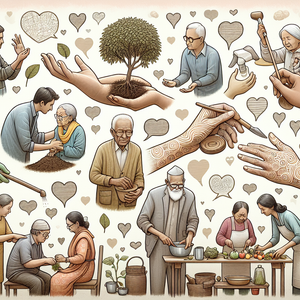The Science of Adventure: Why Traveling Lab Scientists Are Changing Healthcare

Traveling lab scientists are deployed in diverse healthcare settings, ranging from bustling city hospitals to remote clinics in developing countries. Their primary role is to conduct accurate laboratory testing and diagnostics, which are vital for effective patient care. However, their influence extends far beyond performing tests; they play crucial roles in training local staff, implementing cutting-edge technologies, and enhancing laboratory practices. For instance, a traveling lab scientist might be assigned to a rural clinic in Africa to help establish a blood testing protocol. This initiative not only boosts the clinic's capability to diagnose conditions such as malaria but also empowers local technicians with the skills necessary to sustain these practices long after the traveling scientist has left. Such activities can lead to significant improvements in patient outcomes and contribute to broader public health efforts.
Challenges and Rewards
While the work of traveling lab scientists is immensely rewarding, it is fraught with challenges. They often face resource limitations, such as outdated equipment, lack of supplies, or inadequate training among local staff. Overcoming these hurdles requires not only technical expertise but also cultural sensitivity, adaptability, and a willingness to collaborate. The unpredictability of their work environments can be daunting. Traveling lab scientists may find themselves in regions affected by political instability, natural disasters, or public health crises. Despite these challenges, many scientists find profound fulfillment in their work, contributing to communities that lack access to quality healthcare. One traveling scientist recounted her experiences in a remote clinic in Central America, where she helped develop a diabetes screening and treatment program. "Seeing the immediate impact of our work on the community's health was incredibly moving. It reminded me why I chose this career path," she noted. Such personal connections and experiences underscore the meaningful nature of their work.
Influencing Global Health Initiatives
Traveling lab scientists play a pivotal role in shaping global health initiatives through the dissemination of best practices and innovative solutions. Collaborating with organizations like the World Health Organization (WHO) and Médecins Sans Frontières (Doctors Without Borders), they tackle urgent health issues, including infectious disease outbreaks and maternal and child health challenges. The insights gained from working in resource-limited settings often lead to advancements in laboratory science that can influence practices back in their home countries. For example, techniques learned abroad, such as rapid diagnostic testing or efficient resource allocation, can inspire improvements in laboratory efficiency and cost-effectiveness. Additionally, these experiences often cultivate a deeper understanding of health equity, which can inform their approach to local healthcare challenges.
The contributions of traveling lab scientists to global healthcare are profound and multifaceted. They are not mere technicians; they are educators, innovators, and advocates for underserved populations. Through their work, they help bridge gaps in healthcare access and enhance laboratory practices on a global scale. As the demand for healthcare professionals continues to rise, the role of traveling lab scientists is poised to become increasingly vital, paving the way for a more equitable and effective global health landscape. Their adventures serve as a testament to the remarkable impact that dedicated professionals can make when they take their expertise on the road, transforming lives and healthcare systems along the way. In light of the ever-evolving landscape of healthcare, the importance of traveling lab scientists cannot be overstated. Their commitment to improving health outcomes, fostering education, and advocating for health equity positions them as key players in the ongoing journey toward a healthier world for all.
Global Health Laboratory Consultant
World Health Organization (WHO), Médecins Sans Frontières (Doctors Without Borders), local health ministries
Core Responsibilities
Assess and improve laboratory practices in low-resource settings.
Develop training programs for local laboratory staff to enhance diagnostic capabilities.
Collaborate with NGOs and government health agencies to implement best practices.
Required Skills
Expertise in laboratory management and quality assurance.
Experience in global health initiatives and cross-cultural communication.
Proficiency in data analysis and reporting for health outcomes.
Mobile Diagnostics Technician
Health NGOs, community health organizations, mobile health initiatives
Core Responsibilities
Operate mobile laboratory units to provide diagnostic testing in underserved areas.
Conduct field-based quality control measures and maintain equipment functionality.
Educate communities on health issues and the importance of diagnostics.
Required Skills
Hands-on experience with laboratory equipment and diagnostic tools.
Strong interpersonal skills for community engagement.
Flexibility to adapt to different environments and conditions.
Clinical Laboratory Educator
Academic institutions, healthcare organizations, international training programs
Core Responsibilities
Design and deliver training modules for laboratory personnel in various healthcare settings.
Evaluate the effectiveness of training programs and make adjustments as necessary.
Stay updated on the latest laboratory techniques and technologies to share with staff.
Required Skills
Background in clinical laboratory science and education.
Strong presentation and communication skills.
Ability to create educational materials and utilize various teaching strategies.
Infectious Disease Laboratory Specialist
Hospitals, public health departments, research institutions
Core Responsibilities
Perform testing and analysis of specimens to identify infectious diseases.
Collaborate with epidemiologists to track disease outbreaks and trends.
Implement and oversee laboratory safety protocols specific to handling infectious agents.
Required Skills
Advanced knowledge of microbiology and infectious disease diagnostics.
Experience with molecular diagnostic techniques, such as PCR.
Strong analytical skills and attention to detail.
Public Health Research Scientist
Academic institutions, public health agencies, international health organizations
Core Responsibilities
Conduct research on health disparities and the effectiveness of laboratory practices in diverse populations.
Analyze data to inform public health policy and laboratory standards.
Collaborate with international health organizations to publish findings and recommendations.
Required Skills
Experience in epidemiology, biostatistics, and research methodologies.
Proficient in statistical software and data visualization tools.
Strong writing and communication skills for publishing research and presenting findings.


